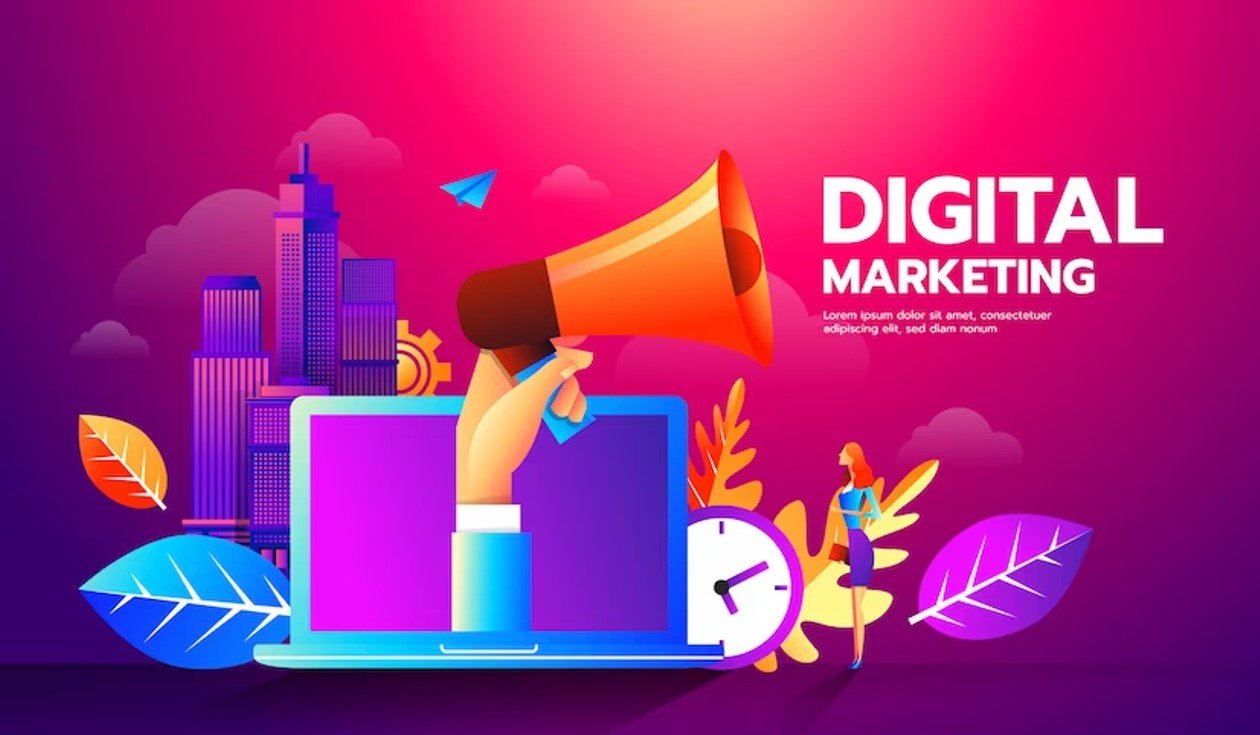The Future of Digital Marketing: 5 Trends to Watch

The future of digital marketing is poised for an exhilarating journey of innovation and evolution. In a rapidly changing digital landscape, businesses are constantly adapting to new technologies, consumer behaviors, and market trends. As we delve into this digital frontier, it becomes increasingly evident that staying ahead of the curve is not merely an option but a necessity for organizations seeking to thrive in the digital age.
Future of Digital Marketing
One of the key drivers shaping the future of digital marketing is the relentless pursuit of enhanced user experiences. From personalized content and immersive technologies like augmented and virtual reality to the integration of artificial intelligence and data analytics, digital marketers are on a quest to engage and connect with consumers in more meaningful and impactful ways.
In this dynamic environment, understanding and harnessing the power of emerging technologies and data-driven insights will be paramount. This article explores the trends, strategies, and challenges that will define the future of digital marketing and offers insights into how businesses can navigate this exciting landscape to achieve success.
Artificial Intelligence (AI) and Machine Learning
Future of Digital Marketing: Artificial Intelligence (AI) and Machine Learning are two transformative fields at the forefront of technological advancement, reshaping industries and driving innovation across the globe. These interrelated disciplines empower machines and computer systems to exhibit human-like intelligence, adaptability, and problem-solving capabilities, marking a profound shift in how we approach tasks and decision-making processes.
AI encompasses a broad spectrum of technologies that enable computers to perform tasks that typically require human intelligence, such as understanding natural language, recognizing patterns, and making decisions based on data analysis. Machine Learning, a subset of AI, focuses on training algorithms to learn from data and improve their performance over time without explicit programming.
This dynamic duo has revolutionized various sectors, including healthcare, finance, manufacturing, and even digital marketing. AI and Machine Learning are not only enhancing automation and efficiency but also unlocking unprecedented insights from vast datasets, ultimately empowering businesses to make more informed decisions and deliver enhanced user experiences. As these technologies continue to advance, their potential applications are limited only by our imagination, promising a future where intelligent machines collaborate seamlessly with humans to drive innovation and solve complex challenges.
Read More: How Digital Marketing Will Help Local Businesses to Grow.
Voice Search Optimization
Future of Digital Marketing: Voice Search Optimization is a crucial aspect of modern digital marketing and SEO strategy. With the proliferation of voice-activated devices and virtual assistants like Siri, Google Assistant, and Alexa, more and more users are using voice commands to search for information online. As a result, businesses and website owners are recognizing the need to adapt their online presence to cater to this growing trend.
Voice Search Optimization involves optimizing your website and content to ensure that it’s easily discoverable and relevant when users perform voice searches. Unlike traditional text-based searches, voice queries are more conversational and long-tail in nature. To excel in this space, it’s essential to understand user intent and anticipate the questions users might ask when using voice commands.
This requires optimizing content with natural language, focusing on conversational keywords, and providing concise, informative answers that align with user queries. Additionally, ensuring that your website is mobile-friendly and loads quickly is crucial, as many voice searches occur on mobile devices. Voice Search Optimization is not just about staying ahead in the SEO game; it’s about delivering a seamless and user-friendly experience that caters to the changing habits of online searchers in the voice-activated era.
Video Marketing Dominance
Future of Digital Marketing: Video Marketing Dominance is a phenomenon that has taken the digital marketing world by storm, and its influence is set to continue growing in the foreseeable future. Video content has emerged as one of the most powerful and engaging mediums for reaching and connecting with audiences across various online platforms.
The rise of video marketing can be attributed to several factors, including the widespread availability of high-speed internet, the ubiquity of smartphones with advanced cameras, and the shift in consumer preferences towards more visual and interactive content. Video allows businesses and brands to tell compelling stories, showcase products or services, and establish a strong emotional connection with their target audience.
Moreover, platforms like YouTube, TikTok, Instagram, and even LinkedIn have made it easier than ever for businesses to share their video content with a global audience. With the advent of live streaming, interactive videos, and augmented reality experiences, video marketing is continually evolving, offering new and exciting ways for brands to engage with consumers. To stay competitive in the digital landscape, businesses must harness the power of video marketing, creating captivating and relevant video content that resonates with their target demographic and provides value in an increasingly visual-centric online world.
Interactive Content
Future of Digital Marketing: Interactive content is a dynamic and engaging approach to digital marketing and online communication that empowers users to actively participate in the content they consume. Unlike traditional static content, such as articles or videos, interactive content invites users to interact, make choices, and engage in two-way communication with the content itself.
Interactive content takes various forms, including quizzes, polls, surveys, calculators, assessments, contests, and interactive infographics. These formats not only capture the user’s attention but also encourage them to take meaningful actions, such as answering questions, sharing their opinions, or receiving personalized recommendations. This level of engagement not only enhances the user experience but also provides valuable data and insights for businesses. Interactive content can be used across different stages of the customer journey, from creating brand awareness to driving conversions and nurturing customer loyalty.
As users actively participate and make choices within interactive content, it can help businesses gather valuable data about their preferences and behaviors, enabling more targeted and personalized marketing strategies. In a digital landscape where user engagement is key, interactive content stands out as a powerful tool to captivate audiences, foster brand loyalty, and drive meaningful interactions. Its versatility and effectiveness make it an integral part of modern digital marketing strategies, promising to shape the future of online communication.
Personalization at Scale
Future of Digital Marketing: Personalization at scale is a dynamic and sophisticated approach to tailoring content, products, and experiences to individual preferences and needs, even when dealing with a large and diverse audience. In the era of digital marketing and customer-centric strategies, businesses are increasingly recognizing the importance of treating each customer as a unique entity, delivering highly relevant and personalized interactions.
The concept of personalization at scale involves leveraging advanced technologies, such as artificial intelligence and machine learning, to analyze vast amounts of data and extract valuable insights about customer behavior, preferences, and demographics. Armed with these insights, businesses can then create customized experiences that resonate with each customer, whether it’s through personalized product recommendations, targeted marketing messages, or individualized content.
Achieving personalization at scale requires not only the right technology but also a deep understanding of the customer journey and the ability to orchestrate personalized experiences across various touchpoints, including websites, mobile apps, email campaigns, and social media. When executed effectively, personalization at scale can result in improved customer engagement, higher conversion rates, increased customer loyalty, and, ultimately, greater business success.
Read More: How to Use Word of Mouth Marketing in a Digital Business?
Conclusion
In conclusion, the future of digital marketing is an exciting landscape marked by remarkable transformations and innovations. From the pervasive influence of AI and Machine Learning to the captivating realm of video marketing dominance, the ever-evolving nature of interactive content, and the power of personalization at scale, businesses are navigating a dynamic environment where adaptation and creativity are paramount.
To succeed in this evolving digital age, organizations must remain agile and forward-thinking, embracing emerging technologies and strategies that resonate with modern consumers. Voice Search Optimization, video marketing, interactive content, and personalization at scale are not mere trends but critical components of a successful digital marketing toolkit.
By staying attuned to these trends and harnessing their potential, businesses can thrive in the competitive digital landscape, connecting with their audiences in meaningful ways and achieving sustainable growth in the years to come. As we move forward, the ability to innovate and adapt will continue to be the driving force behind the ever-expanding horizons of digital marketing.
FAQs
1. Why is AI important in digital marketing?
AI helps analyze data, automate tasks, and personalize content, making marketing efforts more efficient and effective.
2. How can I optimize my content for voice search?
Focus on natural language, use long-tail keywords, and provide concise and direct answers to common questions.
3. What types of businesses benefit most from video marketing?
Virtually all businesses can benefit from video marketing, as it provides a versatile and engaging way to connect with audiences.
4. What is the advantage of interactive content?
Interactive content encourages user engagement and participation, fostering a deeper connection with your brand.
5. How can I implement personalization at scale?
Use AI-driven algorithms to analyze customer data and deliver tailored content and recommendations.







